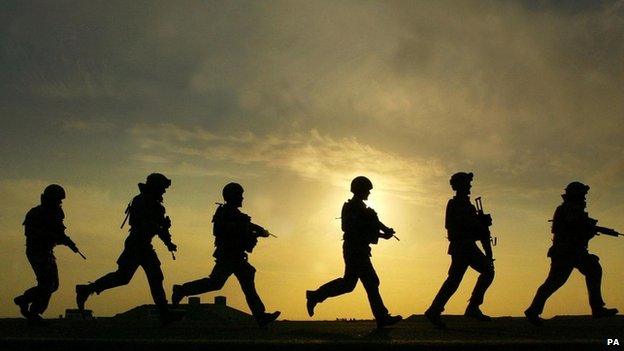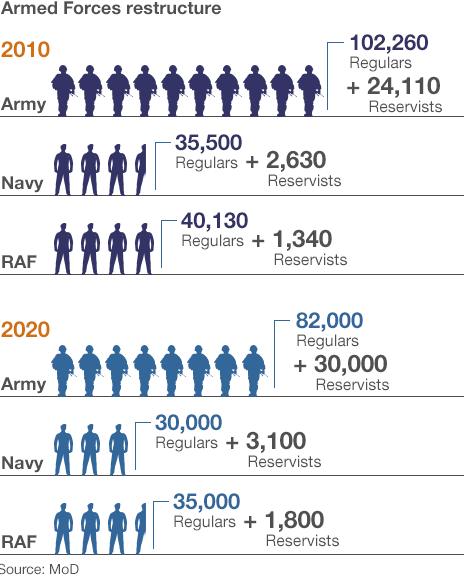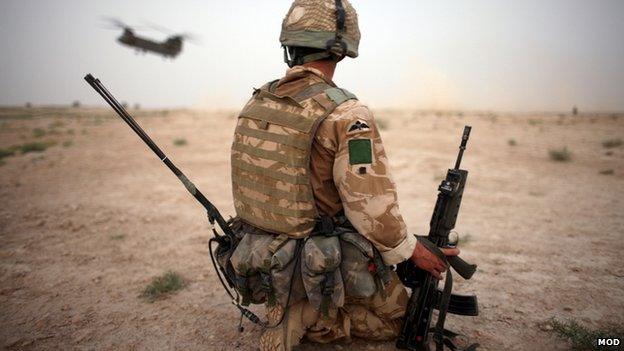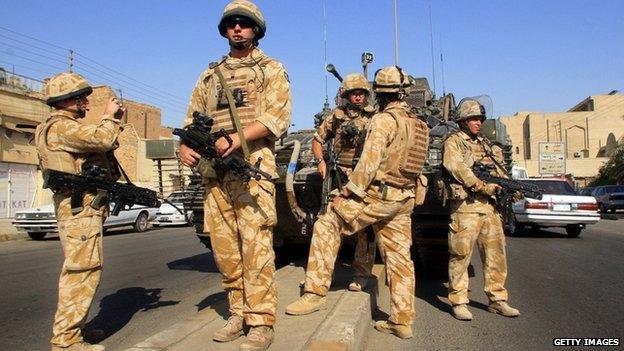MPs raise fears over cuts to Army
- Published

Plans to cut soldiers could leave the Army "short of personnel" and unable to meet future national security needs, a report by MPs has warned, external.
The Commons defence select committee also voices "surprise" at the lack of consultation over the Army 2020 plan.
Under the plan, personnel numbers will be cut from 102,000 to 82,000 by 2018, with a doubling of reservist numbers.
Defence Secretary Philip Hammond said it would ensure the Army was a "flexible and agile force".
The number of part-time soldiers, or reservists, is to be doubled from 15,000 to 30,000, but the Army is still a long way off from meeting its targets and the MPs' report says there is scepticism that it will be able to recruit the numbers it needs.
Overall, the report echoes a familiar theme: the cuts to the armed forces have been driven by the need to save money, rather than any strategic vision of Britain's place in the world.

'Failed to communicate'
The MPs say they were "surprised" at the lack of consultation on such a radical change. The new size of the Army was not part of the original Defence Review in 2010 and had never even been discussed by the National Security Council.
The head of the Army, General Sir Peter Wall, wasn't asked for his opinion either. He was simply told by a senior civil servant what the future strength of his army would be.
So, perhaps it is no surprise the committee feels the Ministry of Defence needs to explain and justify how an army of 82,000 regulars and 30,000 reservists will be adequate to meet the threats of the future.

The cuts have not been thought through and could leave Britain dangerously exposed, MPs say
The MPs say they "remain to be convinced" that the Army 2020 plan represents a fully "thought through and tested concept". They conclude "the MoD has failed to communicate the rational and strategy behind the plan".
But it is not just the lack of strategy that worries them. They're not convinced the Army will be able to deal with the more practical steps of meeting its recruiting targets either.
"We note the scepticism of some of our witnesses that it will be possible to recruit the required number of reservists in the timescale envisaged," they say.
'Worldwide reach'
They say it is "essential" the Army has the ability to undertake future military operations, adding that "any loss of such capability would have serious implications for the UK's national security".
They also note that there is a financial incentive not to use reservists, who will suddenly cost a lot more if they're ever sent on operations. The MPs say "it would be unacceptable if the UK decided not to take part in any action because of the cost of deploying reservists".
Labour claims Britain's armed forces are already significantly under-strength, with a shortfall of 8,000 service personnel.
Shadow defence secretary Vernon Coaker called the report a "damning verdict" and called for Mr Hammond to "pause his redundancy programme until it's clear that Britain's Armed Forces won't be left with a dangerous capability gap".
The MoD says the 8,000 figure is misleading as it includes those who have recently been made redundant as the overall size of the British military shrinks.
There is though clearly a growing challenge in making a career in the armed forces attractive.

The report said the restructuring programme was driven by the need to fit a "financial envelope"
Mr Hammond will have heard most of these concerns before. He's already seen off one attempt to halt the redundancy programme, at least until reservists have been recruited in greater numbers.
He insists there is "no plan B".
Mr Hammond sees this as more than just a numbers game. He says "the changes currently taking effect will ensure the Army has a sustainable and properly funded future, as a flexible and agile force with first-class kit and worldwide reach".
That's his hope, but the defence committee still fears it could all go wrong.
They say if there are any more cuts then Army 2020 could completely "unravel".
- Published11 January 2014
- Published19 December 2013
- Published27 October 2013